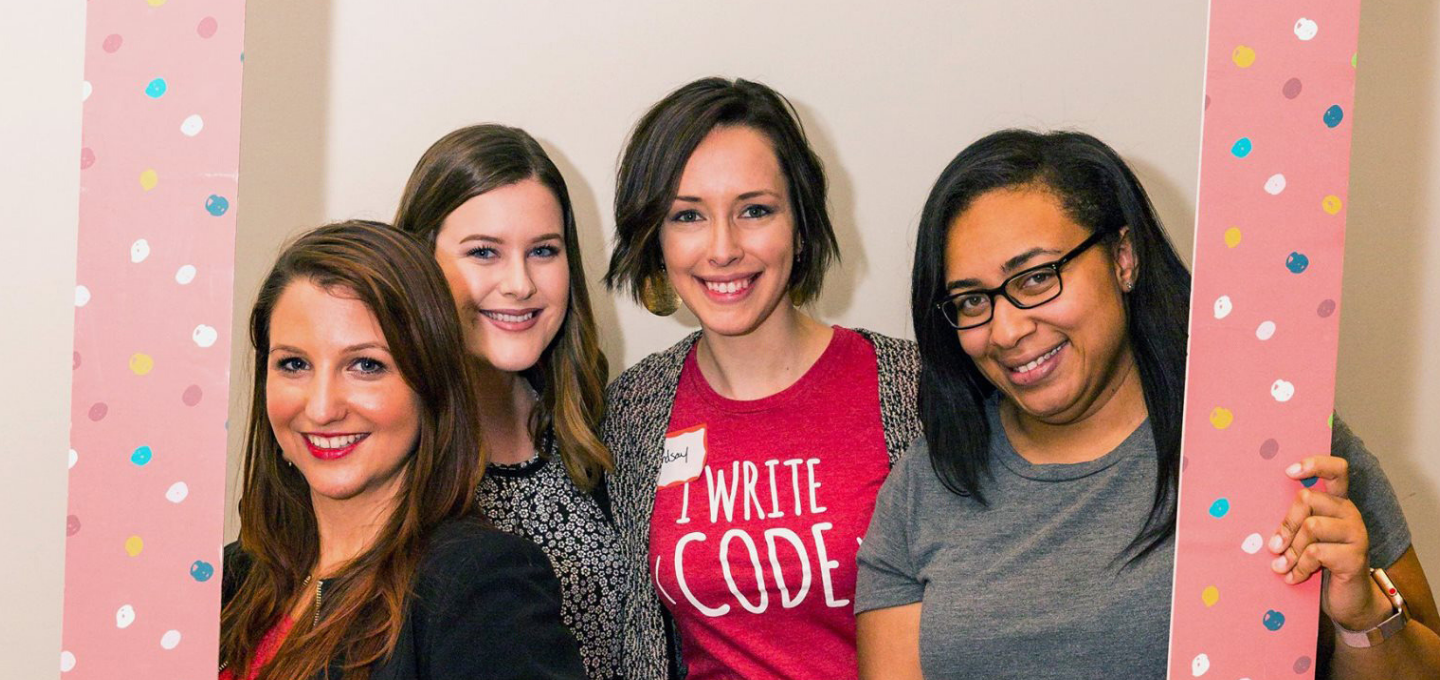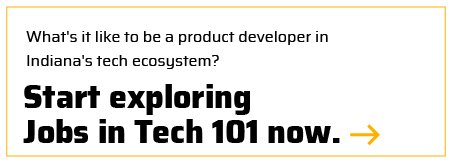Meet Lindsay Siovaila, Lead Solutions Developer at Salesforce
Employer: Salesforce
Job Title: Lead Solutions Developer
Degree Path: Computer Graphics Technology, Purdue University
Hometown: Granger, Indiana
City: Indianapolis, IN
What led you to your getting into tech and this occupation? What was your first job in tech?
I made my way into tech via design. I consider myself a creative at heart, no matter what my day-to-day looks like. I grew up drawing and sketching which eventually led its way into learning Photoshop and graphic design when I was in high school, then web design in college. My first job out of college was working at ExactTarget (now a part of Salesforce) as a brand designer in marketing.
What has been your career path so far?
I was a graphic designer for the first few years of my career at ExactTarget, working in their marketing department on everything from logos to print pieces to PowerPoint presentations, and more. I started dabbling in email and web design, as there wasn’t anyone currently dedicated to that role full-time when I was in marketing. I evolved my role to involve coding the HTML and CSS of the emails and web pages I designed. It was the perfect way to expand my skills because I could leverage my current skills (design) while brushing up on new ones (HTML/CSS for web and email).
A few years later, I made my way into Research & Development (R&D) at Salesforce where I was hired as a front-end designer/developer on a small team that’s focused on building internal apps and tools for our sales department. By this time I was really interested in going further with my development skills, and I was lucky to work with a teammate and mentor who helped me expand my JavaScript and general engineering skills over the years. I’m currently Lead Solutions Developer of the same R&D team, where today I am a full-stack developer and manage the planning and execution of our development projects.
When you think of a day in your life, what are the main work activities you do or responsibilities you have?
As a Lead Developer on a cross-functional team, one of my biggest responsibilities involves making sure the project we’re currently working on is designed, built and delivered in a timely manner and that we’re focusing on the right things as a team. I write a lot of code and also help my team review code before it’s deployed. Since we are a small team and wear many hats, I also stay involved in the design and research portion of the project and make sure all the dots ultimately connect together.
Help us picture your work environment.
I typically spend 3-4 days in the office and work from home the other days. My company is flexible on where you work, so sometimes I hop around to a coffee shop or another Salesforce building to change the scenery. My core team is all located in Indianapolis, and we like meeting in person, so we spend a fair amount of time together. We have check-ins throughout the week to make sure our current projects are on track for delivery. I also have a handful of other meetings scattered throughout the week with members of our sales department to pitch ideas and get feedback from them. Since coding and planning for future projects are a major part of my job, I block off a few days each week of interrupted time to get focused work done when I can plan to have a bunch of quiet time to work.
What do you love about the work you do?
I’ve been on my current team for almost five years, but it feels like I’ve had several completely different roles during that time frame. The variety and continually changing landscape of tech are really exciting to me. I feel like we’ve barely scratched the surface on the potential that tech has to influence the world and integrate with other industries, and it’s exciting to know that I’m in the middle of it all.
Which personality traits, interests, and abilities are important or common for a person to succeed in and enjoy this occupation?
People who are successful at programming are usually lifelong learners and naturally curious individuals who enjoy problem-solving, asking questions and coming up with creative solutions. Unlike the stereotype of a lone wolf programmer, successful developers are comfortable reaching out and working with others, asking questions when they get stuck, and teaching others what they’ve learned so they can level-up the entire team’s knowledge.
Which tools/technologies or technical skills are particularly important for a person to be proficient in for product development jobs?
The world of development moves so fast, and within a few years’ time, a technology you learned may already be on its way out. That being said, you can never go wrong with focusing on the foundations of a coding language, as the themes you learn from the basics will find their way into almost everything you learn down the road.
Which soft skills (aka general business skills or employability skills) are particularly important for a person to be proficient in for product development jobs?
It’s a common stereotype that developers are lone wolves, working alone in a quiet room all day without much interaction with others, and sometimes developers come into the workforce with this stereotype in mind. While being a developer does involve a lot of time for deep, focused work, you’ll make a bigger impact on the business by focusing on how you work with others, as well. Get to know the other developers on the team, as well as designers, researchers, writers, product owners, and leadership. What’s important to these people? What are they trying to accomplish, and how does the code your writing impact their roles and the overall business?
Learning early on how to work as a cross-functional team member will help you focus not only on what you’re building but why you’re building it. Get excited about the business problems you’re solving in addition to learning a hot new coding language. Care about writing good code, but also care about the user experience and who you’re building for. You’ll be a better developer for it.
From your experience with new grads applying for and beginning product development jobs, are they missing any particular knowledge, skills, or experiences that hold them back? Please describe.
Speaking for myself, when I was a new grad and entering the workforce, I had a learning curve as I adapted to the working world when it came to presenting my ideas to different members of my team. Discussing something with a coworker versus presenting something to the VP of my department are different things – and learning how to frame my conversations according to what was most important for the person to know took some time (and is still something I work on!).
I also had to learn to come to my manager with possible solutions or ideas when I was facing a problem. I used to come to my manager expecting them to have all the answers, but the truth is, there are so many problems to solve, and you were hired to help solve them! Being prepared before my one-on-ones with ideas or possible solutions to problems made my interactions with my manager so much more productive because instead of expecting my manager to tell me what to do, we worked through it together.
Which resources, people, books, websites, etc. would you recommend to those who want to learn more or advance their skills in this occupation?
There are so many amazing resources online if you want to learn how to code or continue leveling up on your skills. I’d encourage anyone wanting to code to explore different mediums and types of learning platforms – blogs, books, YouTube videos, and interactive e-courses – to find what works for you.
More importantly, I think, try to connect with individuals locally via meetups who model what you’re looking to learn, and ask them a lot of questions and use them as a resource when you get stuck or need help with something (I’m always open for this, by the way!). When you’re ready, find someone whom you can teach what you’re learning – it might sound counterintuitive at first, but teaching really helps you go a click deeper and solidify what you’ve been learning – and you get to help someone else while you’re at it, too!
What encouragement or advice would you offer to others considering this occupation or wanting to stand out amongst others?
One of my biggest struggles as a developer has been learning to be okay with not knowing everything. There’s so much to learn as a coder, and you will always be a beginner in some way, which is exciting and also frustrating at times! It’s normal, and everyone feels like this. Just remember, you probably know more than you give yourself credit for.
The other thing I’ve had to work on is learning to take breaks for my mental and physical health. It’s easy to sit at a computer for hours and forsake good habits like healthy eating and exercise. Learning to focus on those things and stepping away when I’m stuck on something has made me a better person and a better coder.
Finally, no matter where you are in your career, anyone can learn how to code at any point, and many coders come from a wide range of backgrounds, which is wonderful. Having people building products with diverse backgrounds helps the team come up with more thoughtful solutions. So if you’ve been in the workforce for five days or five years or more and want to try your hand at coding, go for it!



